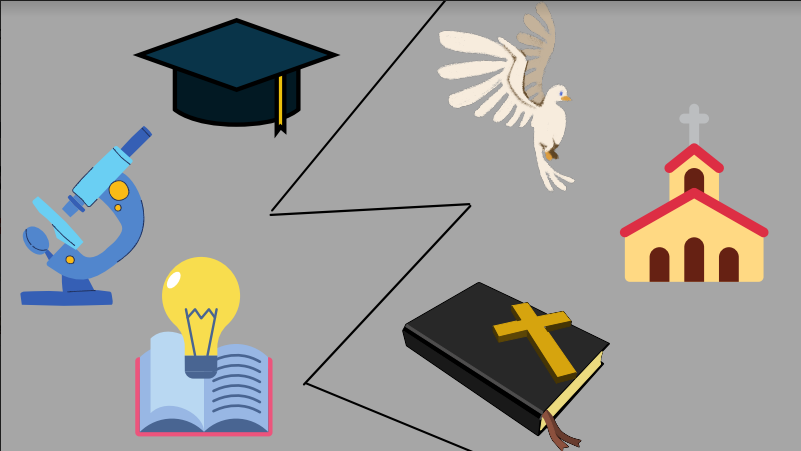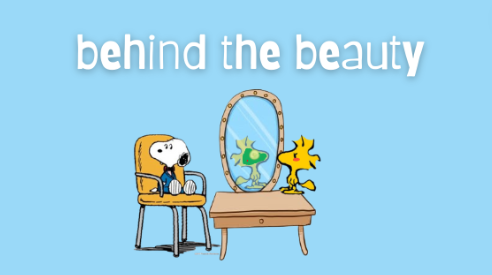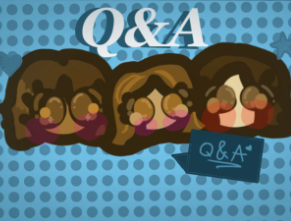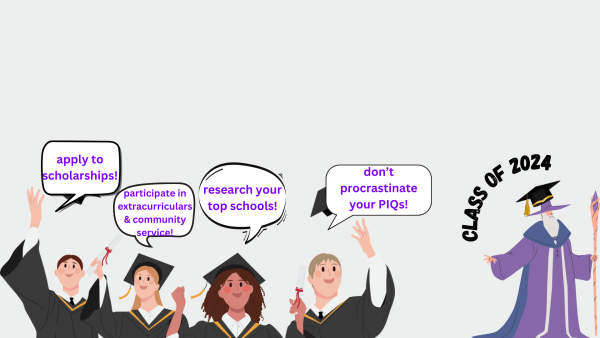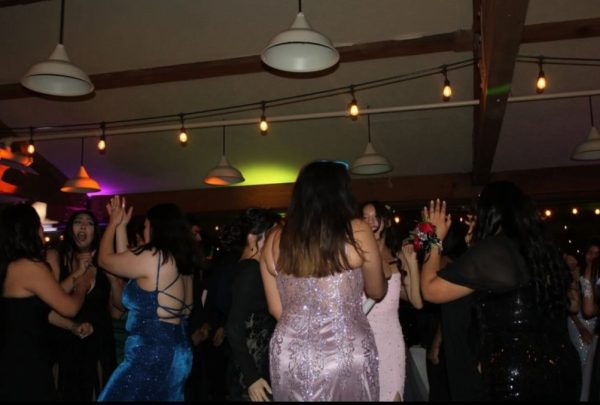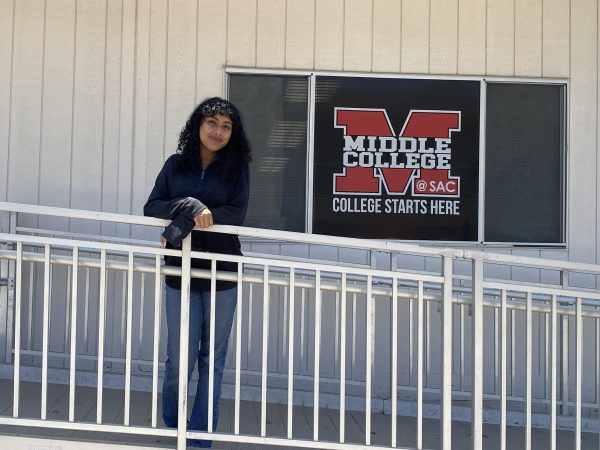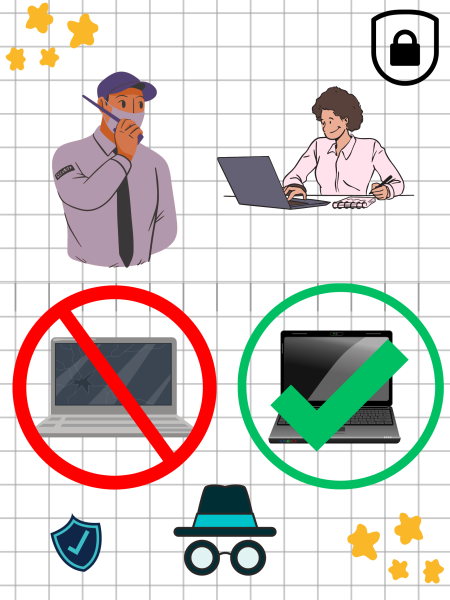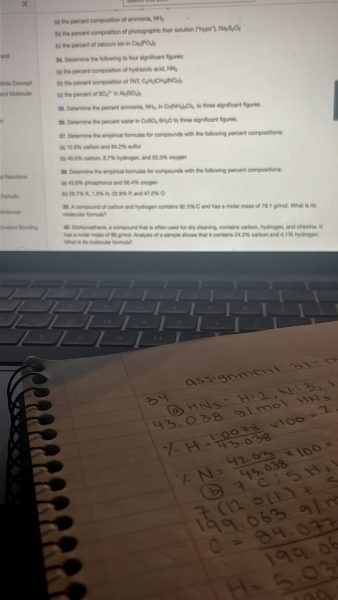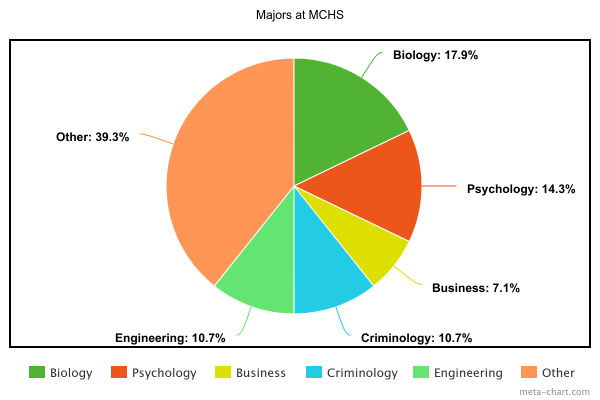Losing faith in your religion
Esmeralda Coeto Medina (created with Canva)
The church and public schools have contradictions, but ultimately, it is the student who decides what they want to believe.
Every year before the school year starts, I go to mass to receive a blessing from the priest so that I do well in school. This year, after many other students and I received our blessing, the priest said, “Parents, you have to be careful of what children are learning in school because school is driving them away from their religion.”
How is the public education system pulling students away from their religion?
The American Association of School Administrators proclaims, “Public schools may not provide religious instruction, but they may teach about religion.”
What is the difference between teaching religion and teaching about religion?
Religious instruction or teaching religion means that the education that a student is receiving is indoctrinating them to a particular religion. An example of this would be religious private schools that identify with a specific religion and enforce practices or prayers.
On the contrary, teaching about religion is the act of introducing the role of religion in a historical, cultural, and literary way.
This means that students in public schools can analyze biblical metaphors, observe references to the Bible, and learn about the importance of religion in the lives of other people and its effects. However, certain rules are applied: public schools can’t promote religion, degrade a particular religion, or interfere with beliefs. Instead, teachers and staff must address religion in an unbiased, neutral, and factual viewpoint. This is an example of the separation of church and state.
U.S. History teacher, Rafael Ramos, said that “no government should promote or impose any religion on its citizens and as a taxpayer-funded institution that is also true for education.”
Public schools and teachers can’t promote religious lessons because tax money funds public schools. On the other hand, private schools can further implement religious lesson plans because that is the education that they are paying to receive.
However, regarding public education, Ramos said: “I think that when you are teaching or covering religion, it is the duty of the teacher to present it as objectively as possible.”
Ramos, who has been teaching history for 16 years, thinks of ways to represent religion in a respectful manner for all.
“I address it (religion) where it’s appropriate in the context of U.S. History,” he said. “I don’t impose religious beliefs.”
Junior Dani De La Cruz, who is an atheist, said that public schools have been “not so religious to the point where teachers respect (the beliefs of others).” They said, “I’ve only heard about religion in an informative way.” As educators, it is their duty to present information in a way that doesn’t upset others and doesn’t force anyone to think a particular way about any religion.
The way that a student or adolescent associates or dissociates with their religion is largely caused by other influences that they have, alternative interpretations they have heard, and other personal experiences.
De La Cruz said, “Religion doesn’t make sense. I never understood the point of the Bible or having a God.”
In their case, their personal experience at school shaped their identity. De La Cruz recalls watching a BrainPOP video in 6th grade where they learned about the word atheist. Ever since they have used that word to describe themselves.
“I am not religious. I’m pretty much atheist,” they said.
Senior Ali Naqvi is a Shia Muslim who was born into a religious family and at first, it was expected for him to follow that religion. However, as he got older and matured, he became passionate about his religion.
In a religious lecture Naqvi heard that “Islam is a religion about looking after both yourself and your community.”
He mentioned that a part of his personality had been made up by his religion.
“Religion can make up a person such as their beliefs; it can help you learn about others like their motives and the kind of person they are,” Naqvi said.
On the other hand, Ramos doesn’t agree with the idea that public education is guiding students away from their religion.
He said, “I think it’s unfair to try to use public education as a scapegoat. It has existed for over 100 years. If it was public education that was guiding them away, then we would have seen a real drop in the number of people who are religious a long time ago. The reality is that the number of people who identify as religious fluctuates all the time and if there is a real drop, it has only begun to happen recently.”
He suggests that religious leaders reevaluate how they are addressing their congregations. If they aren’t providing a message that their followers find engaging, or relevant, then their followers might not find a reason to attend mass.
Ramos said, “I think that the idea he (the priest) was referring to, is that education, in general, makes some students think critically and that’s when they question things.”
Thinking critically makes a person wonder why things are the way that they are and whether or not that thing in question should be removed. A subject that often contradicts religion is science because it deals with investigations regarding the real world and religion is based more on spirituality and worshiping a God(s).
Junior Fatima Del Carmen who is Catholic explains that religion and science are polar opposites. She mentioned that in the Bible, God is the creator of the world. However, what she has learned in science has told her that because of evolution everything has adapted and changed.
Del Carmen said, “There are a diversity of thoughts at school. I have to consider both aspects of science and religion.”
Some individuals may have been heavily influenced by religion, have had no influence, or never understood the concept of religion. However, there are some students who learn to embrace their religion.
Junior Yancy Vasquez-Almendariz who is Catholic has also learned about evolution and even though it contradicts concepts that she has read in the bible, that alone does not guide her away from her religion.
“It (school) doesn’t drive me away, it just imposes new ideas in my head.” She also said, “I discovered being truly Catholic because I make my own decisions.”
School is a place where students should feel comfortable and not judged for their beliefs. All aspects of religion that are covered in school are addressed in a respectful and informative way. It is not the school nor the teachers’ intentions to gear their students’ beliefs. Rather it is the individual’s choice to decide whether or not they would like to participate in a religion.
“School shouldn’t impact us. At the end of the day, we choose what side we believe in,” said Vasquez-Almendariz. “I personally have experienced the love of God, with his guidance and love, I noticed that I started doing things that I never thought I would be doing.”
Naqvi said, “For me personally, my faith in my religion is much stronger than any outside force because I simply love my religion that much.”
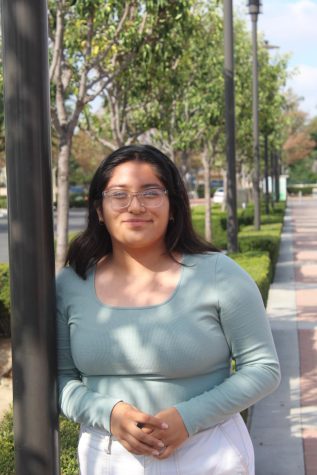
My favorite animal is a polar bear, I love strawberries, and my favorite subject is biology.


